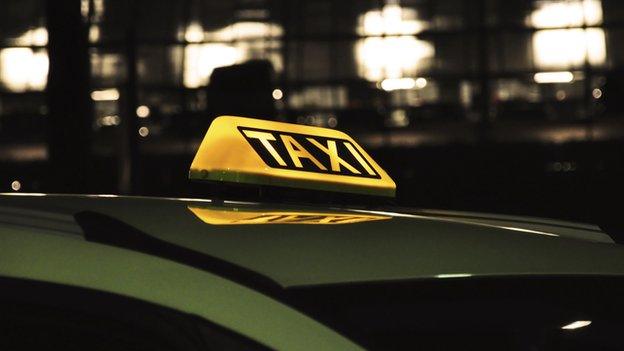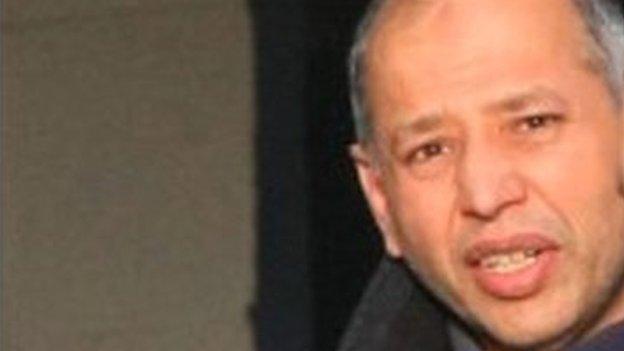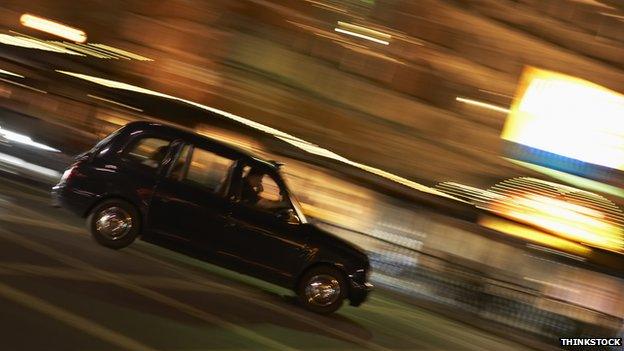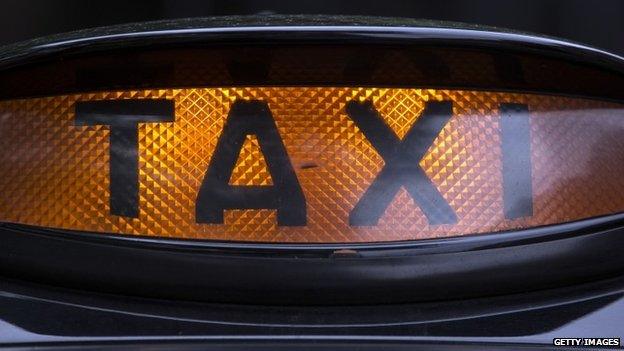Convicted drivers given taxi licences, BBC Scotland finds
- Published

Drivers with convictions for offences such as assault, housebreaking and drink-driving were issued taxi licences last year, a BBC Scotland investigation has revealed.
Councils approved 1,584 applications from people with convictions.
Data obtained by the BBC also shows that councils received more than 1,200 taxi-related complaints in 2014 - a small rise on the previous year.
But the Scottish Taxi Federation said the public should not be concerned.
Bill McIntosh, general secretary of the body which represents the taxi trade, played down the conviction and complaint figures.
He said: "All Scottish licensing authorities are required to ensure that in granting a licence to drive a taxi or a private hire car, the applicant meets with their interpretation of being a fit and proper person.
"[And] taking into account that there are approximately 36,500 licensed taxi and private hire car drivers throughout Scotland, and the many millions of journeys undertaken, it could be argued that the number of complaints made were in real terms relatively small."
However, he added: "This is not to suggest that we should be dismissive of the numbers."
Criminal records
The new figures - obtained through a series of co-ordinated freedom of information requests - come in the wake of Glasgow taxi driver Arshad Mohammed being found guilty of raping a female passenger.
And an East Renfrewshire taxi driver is currently awaiting sentence after admitting placing female passengers in a state of fear or alarm and lying on his licence application.
Michael Boyd, who had previously surrendered his East Ayrshire licence after a series of complaints, said on his application form that he had never previously held a taxi driver's licence.

This year Arshad Mohammed was found guilty of raping a female passenger in 2010
Police Scotland said the relevant checks had been carried out at the time of Mr Boyd's application to East Renfrewshire, with a negative result.
The force said it was now developing a national IT system which would act as a "single point of reference for licences that had been granted or revoked by the relevant local authority".
A recent amendment to the 1974 Rehabilitation of Offenders Act currently stipulates that applicants for taxi and private hire car licences must declare all previous spent and unspent convictions.
Each council's licensing committee then typically consults with Police Scotland on all submitted taxi licence applications.
The committee then meets to discuss individual applications where objections have been raised, or inconsistencies have been detected, by the police.
The figures obtained by BBC Scotland show that the highest number of drivers with criminal histories have been issued licences by Glasgow (290), Edinburgh (257) and Falkirk (184) councils.
Many of the convictions are related to common traffic offences such as speeding or running a red light.

Many previous convictions of taxi drivers were related to common traffic offences such as speeding - but others included assault, breaches of the peace, and housebreaking
But other convictions included assault, breach of the peace, car theft, drink-driving, indecent exposure and possession of an offensive weapon.
Two licensed drivers in the Borders had charges dating back to the 1970s related to unlawful carnal knowledge of girls under 17.
In East Ayrshire, a licence was issued to an individual who had carried out 49 offences, including assault and theft, as well as repeatedly driving while disqualified and without any insurance.
In that particular case, the council said a panel had fully considered all previous convictions - the last of which was from 2006.
Guidance from the Scottish government, external suggests "local licensing authorities will want to consider each case on its merits, but they will doubtless take a particularly cautious view of any offences involving violence, and especially sexual attack".
The report was guided by a concern that "the industry is protected from infiltration and targeting by organised crime groups".
A spokesperson for Highland Council said there were "no hard and fast rules" about who should be granted a licence.
"An applicant with a series of recent convictions, for example, is more likely to be considered not to be a fit and proper person than an applicant with older convictions whose record shows that he or she has not re-offended for a considerable time," it said.
Complaints increase
The BBC Scotland investigation revealed that taxi-related complaints had doubled, and even trebled, in some council areas.
Aberdeen City Council received 144 complaints in 2014 - up from 51 the previous year.
And the reporting of grievances doubled in East Ayrshire, East Dunbartonshire, Highland and South Lanarkshire.

The most complaints were received by Edinburgh (340), North Lanarkshire (210), and Aberdeen (144).
The bulk of complaints were related to the personal behaviour of drivers, and dangerous driving.
But Highland Council also received complaints including tailgating, money laundering and the sale of drugs and alcohol from licensed vehicles.
The complaint data also revealed that an East Ayrshire driver had his licence suspended in February 2014 after allegedly "placing a lone female in a state of fear and distress".
Racial abuse
Assault and racial abuse were among the grievances filed to West Dunbartonshire council since 2010.
There were also complaints regarding public urination, fare disputes, vehicle conditions, drivers electing to take longer routes and refusals to take guide dogs.
However, grievances were not only filed by passengers but also by other by other cabbies for infractions by drivers of private hire vehicles.
Only Hackney carriages may pick up passengers from authorised taxi ranks or if hailed in the street.
A spokesperson for Falkirk Council said it was "impossible" to make any correlation between a driver's criminal history and the complaints.
The council said: "Once a driver is licensed they are subject to an annual renewal process which enables both the police and the licensing authority to undertake checks on the continuing fitness of the driver."
Complaints across Scotland rose marginally between 2013 and 2014, from 1,167 to 1,201.
However, a number of councils refused to release their complaint data, or only released a portion of it, so the actual number of annual grievances is likely to be higher.
'Lack of evidence'
Most councils in Scotland have enforcement units, empowered by the 1982 Civic Government Act, to investigate any alleged wrongdoing.
But the data obtained by BBC Scotland reveals that often many of the complaints are not upheld.
No action was taken in nearly 90% of the complaints submitted to Falkirk Council in 2014.
In South Ayrshire, two-thirds of complaints were not upheld.
The spokesperson for Falkirk Council said disciplinary action was often not taken due to a lack of evidence or corroboration of events.
They said: "This is particularly the case when taxi drivers complain about each other and the licensing authority finds itself in a position of having to deal with 'tit for tat' complaints.
"Other types of complaints are not of the nature where formal action would be suitable, for example in relation to personal hygiene and appearance issues.
"There are, of course, a number of complaints where the complainant does not wish to pursue the matter beyond the driver being made aware of their complaint."
- Published31 March 2015

- Published15 October 2010